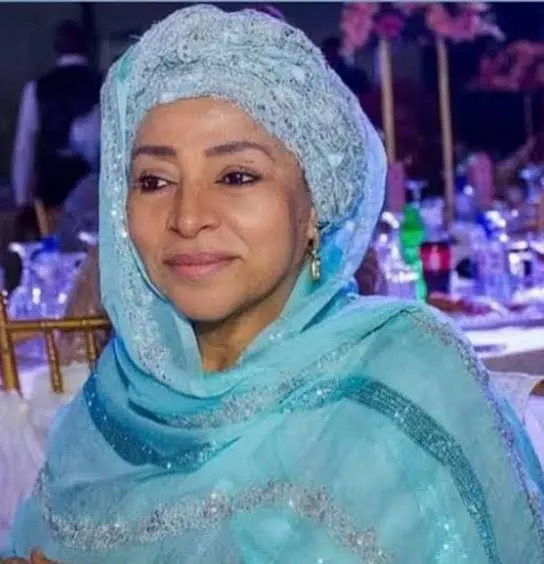OPINION
Tell That To The Marines, Madam Abacha: Nigeria’s Money Was Looted, Not Saved

ISAAC ASABOR
If there is anything Nigerians have become well-versed in over the decades, it is the repetitive insult to their collective intelligence by individuals who once held power or were beneficiaries of the corridors of power. The most recent affront came from none other than Maryam Abacha, the widow of Nigeria’s late military dictator, General Sani Abacha, who, in a rather bizarre and self-serving claim, stated that her late husband “saved money” for Nigeria. Well, having heard her own side of the story, let us call it what it is, a tasteless joke.
Only in Nigeria would a former First Lady, comfortably cocooned in ill-gotten wealth, have the audacity to gaslight a nation still licking the wounds inflicted by her late husband’s kleptocracy. Nigerians should be forgiven for wondering if Madam Maryam mistook her interview by a reputable television station for a Nollywood audition. The claim that Sani Abacha “saved” money for Nigeria, not in the Central Bank or a sovereign wealth fund, but in private offshore accounts, is as ridiculous as saying a kidnapper was just offering “shelter” to his victim.
If I may join other Nigerians to ask, “When did “Saving” for one’s country mean stashing billions in foreign accounts?” One must genuinely ask: “When did it become an act of patriotic governance for a head of state, military or civilian, to “save” public funds in secret bank accounts in Switzerland, Liechtenstein, Jersey Island, and Luxembourg? Which governance manual authorizes this style of economic stewardship? Maybe Madam Abacha should cite her source because, to the average Nigerian, this narrative is beyond comprehension.
Let us consider the logic she wants us to buy: that her husband, a military dictator who ruled Nigeria with an iron fist between 1993 and 1998, decided, out of the kindness of his heart, to safeguard Nigeria’s wealth in his own name, in countries where even their own citizens are not allowed to hoard undeclared billions. That logic is so flawed, it is not even laughable. It is insulting.
If Sani Abacha was truly “saving” money for the country, why were the funds hidden under layers of shell companies and anonymous offshore trusts? Why didn’t he announce these so-called “reserves” to Nigerians or place them in a transparent sovereign wealth fund like Norway or the UAE? If the money was for Nigeria, why was it hidden like stolen goods? Tell that to the marines, Madam!
In fact, when her story was shared with some of my colleagues in the newsroom, few hours before hitting the keyboard to write this piece, a short history of a long heist that characterized governance in Nigeria was narrated by one of my senior colleagues. He said “Between 1998 and today, Nigeria has recovered over $3.6 billion in looted Abacha funds”. Let that number sink in. And this is just what has been recovered, experts estimate that the total amount looted by the Abacha regime could be closer to $5 billion or more. That is more than the education budget of several Nigerian states combined.
My senior colleague explained that to date, these funds have been repatriated from various countries, including Switzerland ($700 million), the United Kingdom, the United States, and the Bailiwick of Jersey, among others. Each time the funds are returned, it comes with global headlines and shameful footnotes. What is even more damning is that these recoveries were accompanied by legal documentation proving that the money was funneled through illegal and corrupt means.
Yet here we are, being serenaded by revisionist tales of a dictator-turned-savior. If this is not gas lighting, what is it?
At this point, it is worth taking a breather and remembering another Nigerian politician, the late Alhaji Barkin Zuwo, former governor of Kano State during the Second Republic. Zuwo became infamous not just for his flamboyant public speaking but for one hilarious revelation when the military overthrew the civilian government in 1983. When security agents stormed his residence, they discovered N3.4 million in cash neatly stacked in his home. Asked why so much public money was being kept in his personal residence, Zuwo gave a response that has since become part of Nigeria’s political folklore: “Government money is kept in Government House!”
Now, as comical and ridiculous as Zuwo’s defense was, at least the money was within Nigeria’s borders. He did not claim to be saving it for future generations in Swiss bank accounts. In fact, compared to the layers of deceit wrapped around the Abacha loot, Zuwo comes off as a local town chief who simply did not know better.
And that is precisely the point: when clowns like Zuwo look honest next to a dictator like Abacha, it shows just how rotten things really were, and how rotten the excuse of “saving for Nigeria” truly sounds.
In my opinion, someone should tell Madam Abacha that no one saves money for Nigeria in that manner. Governments “save” money in transparent, accountable institutions, not in coded transactions with European banks using fake companies as fronts.
At this juncture, it is expedient to enlighten Madam Abacha on how leaders save money for government by making reference to the Nation newspaper report of February 21, 2014, where in a news story it was reported that Governor Fashola stated that his administration had “saved over ₦96 billion to service its debt,” emphasizing Lagos State’s fiscal responsibility.
“Governor Fashola said his administration is credit worthy and has saved over N96 billion to service its debt. The state’s debt profile stands at about N435 billion… ‘By 2016, when the second N50 billion bond will be due, we will have over N100 billion to pay it. … If oil falls short today, we will survive.’”
There is no denying the fact that the foregoing reference matters in this context, and that it cannot be pooh-poohed as it is not offshore banking trickery. Rather, Fashola was talking about legitimate, on‑book savings within state finances to ensure Lagos could meet its loan obligations. It is in stark contrast to claims that money was “saved” abroad in secret accounts. Fashola’s comment was about transparent financial planning. If madam is reading this piece, or someone close to her is reading it, I think the foregoing clarification suffices as it clearly explains how leaders save money for the government.
When Governor Babatunde Fashola was commended for saving Lagos State funds during his tenure, it was because the funds were traceable within government coffers and were used to develop infrastructure.
Even in this democratic dispensation, for all its flaws, governors and presidents do not stash “savings” in offshore tax havens under pseudonyms. If they do, it is called corruption, not patriotism. Let us stop dancing around the truth.
By that same logic, every armed robber who buries cash in his backyard is a future philanthropist. Every yahoo boy transferring money abroad is “securing Nigeria’s future.” Every politician hoarding dollars in a septic tank is just “saving for hard times.”
With all due respect, Madam Maryam Abacha should be advised to allow sleeping dogs lie. Her late husband’s legacy is already sealed in infamy, and no amount of spin can unmake what the world already knows. If her family truly wanted to honor his memory, they would apologize to Nigerians and make a full and transparent declaration of all the funds still hidden in their custody, instead of doing the needful, she continues to throw salt in an already infected wound.
How many Nigerians died in hospitals without equipment while Abacha was “saving” money in Swiss vaults? How many children dropped out of school because the education system was underfunded while he “saved” money overseas? How many civil servants went unpaid, and how many industries collapsed under the weight of that regime’s corruption?
It is one thing for the Abachas to peddle this nonsense in private family gatherings, but to go public with such historical garbage is an act of sheer impunity. And it is even more dangerous when a few gullible Nigerians, out of tribal loyalty or misplaced nostalgia, begin to parrot this revisionist history on social media.
Nigerians must resist this brand of shameless propaganda with every breath in their body. The truth must be preserved for the sake of generations to come. If we allow ourselves to believe this kind of historical whitewashing, then what stops future looters from justifying their theft as “savings”?
We cannot afford to forget, or forgive, so easily. The pain is still raw, the damage still visible, and the stolen money still being traced across the globe. No one “saves” money for a government in private foreign accounts. That is not patriotism; that is plunder.
So once again, Madam Abacha, kindly go and tell that story to the marines. Because Nigerians are not buying it.
-
CRIME3 years ago
PSC Dismisses DCP Abba Kyari, To Be Prosecuted Over Alleged $1.1m Fraud
-
FEATURED4 years ago
2022 Will Brighten Possibility Of Osinbajo Presidency, Says TPP
-
FEATURED2 years ago
Buhari’s Ministers, CEOs Should Be Held Accountable Along With Emefiele, Says Timi Frank
-
BUSINESS & ECONOMY2 years ago
Oyedemi Reigns As 2023’s Real Estate Humanitarian Of The Year
-
SPORTS2 years ago
BREAKING: Jürgen Klopp Quits Liverpool As Manager At End Of Season
-
SPORTS2 years ago
Could Liverpool Afford Kylian Mbappe For €200 million? Wages, Transfer Fee
-
ENTERTAINMENT2 years ago
Veteran Nigerian Musician, Basil Akalonu Dies At 72
-
FEATURED2 years ago
Tribunal Judgement: Peter Obi Warns Of Vanishing Electoral Jurisprudence, Heads To Supreme Court
-
BUSINESS & ECONOMY2 years ago
Oyedemi Bags ‘Next Bulls Award’ As BusinessDay Celebrates Top 25 CEOs/ Business Leaders
-
FEATURED3 years ago
2023 Presidency: South East PDP Aspirants Unite, Demand Party Ticket For Zone



































